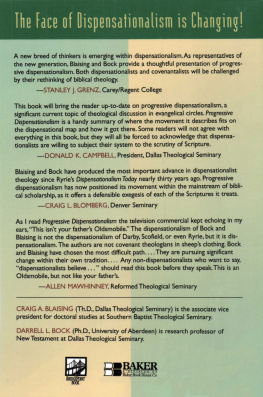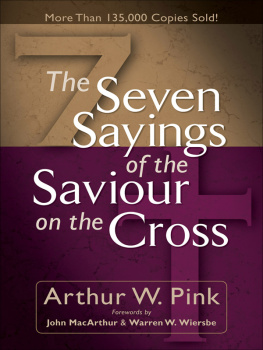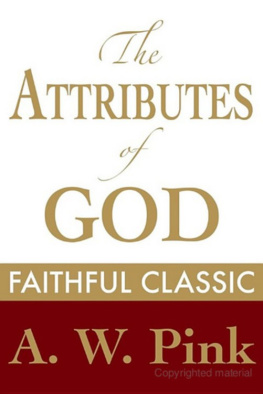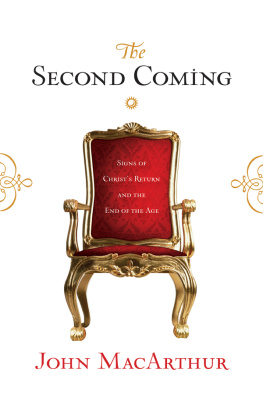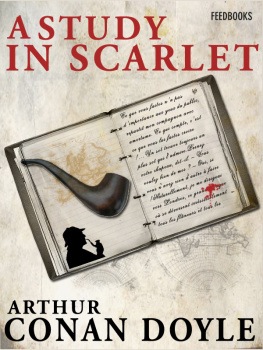Arthur Walkington Pink - A study of dispensationalism
Here you can read online Arthur Walkington Pink - A study of dispensationalism full text of the book (entire story) in english for free. Download pdf and epub, get meaning, cover and reviews about this ebook. City: [Draper, VA], year: 200?, publisher: Apologetics Group Media, genre: Religion. Description of the work, (preface) as well as reviews are available. Best literature library LitArk.com created for fans of good reading and offers a wide selection of genres:
Romance novel
Science fiction
Adventure
Detective
Science
History
Home and family
Prose
Art
Politics
Computer
Non-fiction
Religion
Business
Children
Humor
Choose a favorite category and find really read worthwhile books. Enjoy immersion in the world of imagination, feel the emotions of the characters or learn something new for yourself, make an fascinating discovery.
- Book:A study of dispensationalism
- Author:
- Publisher:Apologetics Group Media
- Genre:
- Year:200?
- City:[Draper, VA]
- Rating:4 / 5
- Favourites:Add to favourites
- Your mark:
- 80
- 1
- 2
- 3
- 4
- 5
A study of dispensationalism: summary, description and annotation
We offer to read an annotation, description, summary or preface (depends on what the author of the book "A study of dispensationalism" wrote himself). If you haven't found the necessary information about the book — write in the comments, we will try to find it.
A study of dispensationalism — read online for free the complete book (whole text) full work
Below is the text of the book, divided by pages. System saving the place of the last page read, allows you to conveniently read the book "A study of dispensationalism" online for free, without having to search again every time where you left off. Put a bookmark, and you can go to the page where you finished reading at any time.
Font size:
Interval:
Bookmark:
A Study on Dispensationalism
Arthur W. Pink
Pink was born in Nottingham, England on April 1, 1886 and becamea Christian in 1908, at the age of 22. Though born to Christian parents, priorto conversion he migrated into a Theosophical society (an occult gnostic grouppopular in England during that time), and quickly rose in prominence withintheir ranks. His conversion came from his father's patient admonitions from Scripture. Itwas the verse, Proverbs14:12, 'there is a way which seemeth right unto a man, but the end thereofare the ways of death,' which particularly struck his heart and compelled himto renounce Theosophy and follow Jesus.
Desiring to grow in knowledge of theBible, Pink emigrated to the United States to study at Moody Bible Institute. Impatient, he leftthere after only two months and began his first pastorate in SilvertonColorado. In 1916 he married Vera E. Russell (January 8, 1893 - July 17, 1962),who was from Kentucky. However, he left after just two months for Colorado,then California, then Britain. From 1925 to 1928 he served in Australia,including as pastor of two congregations from 1926 to 1928, when he returned toEngland, and to the United States the following year. He eventually pastoredchurches in Colorado, California, Kentucky, and South Carolina.
In January 1922 he started a monthlymagazine entitled Studies in the Scriptures which circulated amongEnglish-speaking Christians worldwide, though only to a relatively smallcirculation list of around 1,000.
In 1934 Pink returned to England, andwithin a few years turned his Christian service to writing books and pamphlets.Pink died in Stornoway, Scotland onJuly 15, 1952. The cause of death was anemia.
After Pink's death, his works wererepublished by a number of publishing houses, among them, Banner of Truth Trust, BakerBook House, Christian Focus Publications , Moody Press, Truthfor Today , and reached a much wider audience as a result. BiographerIainMurray observes of Pink, "the widespread circulation of his writingsafter his death made him one of the most influential evangelical authors in thesecond half of the twentieth century." His writing sparked a revival of expositorypreaching and focused readers' hearts on biblical living. Yet, even today, Pinkis left out of most biographical dictionaries and overlooked in many religioushistories.
Having written so much upon both the inspirationand the interpretation of Holy Writ, it is necessary, in order to givecompleteness unto the same, to supply one or two articles upon the applicationthereof. First, because this is very closely related to exegesis itself: if awrong application or use be made of a verse, then our explanation of it iscertain to be erroneous. For example, Romanism insists that "Feed mysheep" (John 21:15-17) was Christs bestowal upon Peter of a specialprivilege and peculiar honour, being one of the passages to which that evilsystem appeals in support of her contention for the primacy ofthat Apostle. Yet there is nothing whatever in Peters own writings whichindicates that he regarded those injunctions of his Master as constituting him"Universal Bishop." Instead, in his first Epistle there is plainlythat to the contrary, for there we find him exhorting the elders or bishops,"Feed the flock of God which is among you, taking the oversight thereof,not by constraint, but willingly; not for filthy lucre, but of a ready mind; neitheras being lords over Gods heritage, but being ensamples to the flock"(5:2,3).
Thus it is quite clear from the above passagethat Christs precepts in John 21:15-17, apply or pertain unto allpastors. On the other hand, our Lords words to Peter and Andrew,"Follow Me, and I will make you fishers of men" (Matt. 4:19) donot apply to the rank and file of His disciples, but only unto thosewhom He calls into and qualifies for the ministry. That is evident from thefact that in none of the Epistles, where both the privileges and the duties ofthe saints are specifically defined, is there any such precept or promise.Thus, on the one hand, we must ever beware of unwarrantable restricting thescope of a verse; and, on the other hand, be constantly on our guard againstmaking general what is manifestly particular. It is only by carefully takingheed to the general Analogy of Faith that we shall be preserved from eithermistake. Scripture ever interprets Scripture, but much familiarity with thecontents, and a diligent and prayerful comparing of one part with another, isnecessary before anyone is justified in dogmatically deciding the precisemeaning or application of any passage.
But there is further reason, and a pressing onetoday, why we should write upon our present subject, and that is to expose themodern and pernicious error of Dispensationalism. This is a device of theEnemy, designed to rob the children of no small part of that bread which theirheavenly Father has provided for their souls; a device wherein the wily serpentappears as an angel of light, feigning to "make the Bible a new book"by simplifying much in it which perplexes the spiritually unlearned. It is sadto see how widely successful the devil has been by means of this subtle innovation.It is likely that some of our own readers, when perusing the articles upon theinterpretation of the Scriptures, felt more than once that we were taking anundue liberty with Holy Writ, that we made use of certain passages in a wayaltogether unjustifiable, that we appropriated to the saints of this Christianera what does not belong to them but is rather addressed unto those who livedin an entirely different dispensation of the past, or one which is yet future.
This modern method of mishandling the Scripturesformodern it certainly is, being quite unknown to Christendom till little morethan a century ago, and only within recent years being adopted by those who areoutside the narrow circle where it originatedis based upon 2 Timothy 2:15,"Study to show thyself approved unto God, a workman that needeth not to beashamed, rightly dividing the word of truth." Very little or nothing atall is said upon the first two clauses of that verse, but on the third one,which is explained as "correctly partitioning the Scriptures unto thedifferent peoples to whom they belong." These mutilators of the Word tellus that all of the Old Testament from Genesis 12 onwards belongs entirely toIsrael after the flesh, and that none of its precepts (as such) are bindingupon those who are members of the Church which is the Body of Christ, nor mayany of the promises found therein be legitimately appropriated by them. Andthis, be it duly noted, without a single word to that effectby either the Lord or any of His Apostles, and despite the usewhich the Holy Spirit makes of the earliest Scriptures in every part of the NewTestament. So far from the Holy Spirit teaching Christians practically to lookupon the Old Testament much as they would upon an obsolete almanac, Hedeclares, "For whatsoever things were written aforetime were writtenfor our learning, that we through patience and comfort of the(Old Testament) Scriptures might have hope" (Rom. 15:4).
Not satisfied with their determined efforts todeprive us of the Old Testament, these would-be super-expositors dogmaticallyassert that the four Gospels are Jewish, and that the Epistles of James andPeter, John and Jude are designed for a "godly Jewish remnant" in afuture "tribulation period," that nothing but the Pauline Epistlescontain "Church truth," and thousands of gullible souls have acceptedtheir ipse digitthose who decline so doing are regarded asuntaught and superficial. Yet God Himself has not uttered a single word to thateffect. Certainly there is nothing whatever in 2 Timothy 2:15, to justify sucha revolutionizing method of interpreting the Word: that verse has no more to dowith the sectioning of Scripture between different "dispensations"than it has with distinguishing between stars of varying magnitude. If thatverse be carefully compared with Matthew 7:6, John 16:12 and 1 Corinthians 3:2,its meaning is clear. The occupant of the pulpit is to give diligence inbecoming equipped to give the different classes of his hearer "their
Next pageFont size:
Interval:
Bookmark:
Similar books «A study of dispensationalism»
Look at similar books to A study of dispensationalism. We have selected literature similar in name and meaning in the hope of providing readers with more options to find new, interesting, not yet read works.
Discussion, reviews of the book A study of dispensationalism and just readers' own opinions. Leave your comments, write what you think about the work, its meaning or the main characters. Specify what exactly you liked and what you didn't like, and why you think so.






